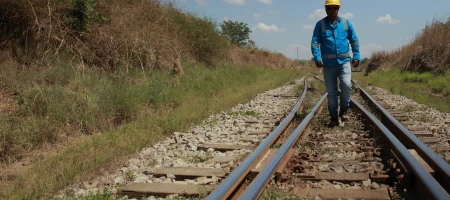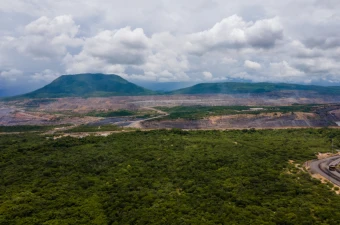
The Colombian Latin American Case
More and more countries are feeling the urgency to reduce their carbon footprint. State policies are being developed to reduce coal imports. Countries are moving to more environmentally friendly energy sources. But it is the people in the sourcing countries who are prone to experience the severe socio-economic consequences of mine closures from day to day. Colombia is the first case of such an energy transition. Its experiences can serve as a model for many other countries to follow.
It is the Latin American country with the greatest progress towards the energy transition, according to the World Economic Forum. It also has great potential as a sustainable energy production territory in the regions that are currently coal mining. But the transition has a profound socio-economic impact on the mining region in the north of Colombia.
The climate emergency is a reality in the whole world. Natural disasters, which are the product of the excessive exploitation of natural resources, mean that today we witness the apocalyptic scenario that the pioneers investigating global warming have been warning us about. Just in North America (the United States and Canada) more than 400 people died due to an intense heat wave. It is estimated that at least 70 people lost their livesafter strong floods in Germany and Belgium during the second half of this 2021.
These disasters, product of a global temperature increase of 1.2 °C, seem to be only the tip of the iceberg of an increase of 2 °C by the middle of the century (year 2050). Thanks to the signing of the Paris Agreement in 2015 measures were established to reduce greenhouse gas emissions. In order to carry out energy transition in industrialized countries, a process was initiated which in the long term promises great benefits. It empowers people, calls them to participate, boosts the economy and diversifies markets.
Labor and environmental legislation
One of the important ‘advantages of the mining and energy sector in regions such as Latin America, are the cost of labor and the lack of environmental legislation. It led to large multinationals establishing their export coal mines in countries as Colombia. The closure of this industry without a transition that considers all the actors in the production chain could have severe impact. It would leave thousands of families without a livelihood. It would destabilize the economies of these countries. It would also ignore the responsibility of companies responsible for environmental damage they caused for several decades. This even generated the displacement of entire communities.
"The transition has a profound socio-economic impact on the mining region in the north of Colombia"
Large coal reserves
Regarding the international context, Colombia has the largest coal reserves in Latin America. It is the fifth-largest exporter of thermal coal in the world. Colombian coals are basically hard coals (thermal, metallurgical-coking and anthracite). Currently, thermal coal represents 97% of production and exports.
The armed conflict
Besides that, there is a relationship between the armed conflict and the coal mining sector during paramilitary violence in Colombia. In the context of the violent conflict both national and foreign businessmen were able to massively buy parcels for the development of mining-energy projects. The National government granted licenses to multinationals to carry out such purchases and resettle communities.
This historical process of capital accumulation in this industry is a decisive factor in the increase of inequality in the country. The mining companies have a responsibility for the recovery of the society affected by the violence of the war. A specific part of this responsibility is to ensure stability for the employees who have worked for these mining multinationals many years.
Coal market development
The commitments agreed to in the Paris Agreement entail a decrease in the demand for coal at the international level. This does not mean that the coal market will cease, at least not in the coming years. Nevertheless it does mean that the main coal exporters will have to redirect their market. Due to the decreasing demand they are entering in greater competition. As a consequence selling prices of coal will fall.
Collective energy right
The success of sustainable energy development on a global scale depends on the recognition of responsibility of companies that buy coal, international cooperation and State policies. A structural new approach in the energy sector is required, starting with the recognition of energy as a right. Corporations and the state have the position to generate energy, but the society in general always has to be involved.
Energy justice
Thus, when we are speaking about energy transition, we must not only refer to the change of energy resources, but also to a just transition that leaves no one behind. The just transition is related to energy justice. It encompasses dimensions of distributive, procedural and recognition justice, and climate justice. It also deals with historical responsibility, per capita equity, and social and environmental rights.
Reconciliation
The aim of just transition is to reconcile social, economic and environmental aspects. The material conditions of the most vulnerable populations have to be reconciled with the search to maintain the stability of the climate on earth. To achieve this an equitable structure is required, combining capacity transformation plans, new developments in economic activities, special funds for investment in education and social plans for direct and indirect workers.
Social plan
A recent energy transition in the Netherlands started with years of, worker-led struggles. It resulted in a tripartite collective social plan in which the Ministry of Social Affairs agreed to take concrete steps to help coal industry employees who lost their jobs. With a financial injection of € 22 million, all employees of the coal production chain in and around the Hemweg electric power plant in Amsterdam can receive government support. It enables their transition from one job to another and includes training. In addition, other agreements arrange income compensation for people who are not able to find a new job.
Sustainable Development Agenda
For the transition to be effective, it must be accompanied by social dialogue between the different actors involved in the process, mainly workers and unions, affected local communities, governments, and companies. Thanks to the International Labor Organization (ILO), the Just Transition has been incorporated into the Sustainable Development Agenda. It lead to the formulation of “Policy Guidelines for a Just Transition towards Environmentally Sustainable Economies and Societies for all”. They are based on the four pillars of the Decent Work Agenda: social protection, employment, labor rights and social dialogue.
Decent work
Likewise, the Just Transition has become very important in achieving the Sustainable Development Goals (SDGs) and, therefore, in efforts to counter climate change. An example of this is Goal 8, which seeks to “Promote inclusive and sustainable economic growth, employment and decent work for all”. The demand for decent work is imprinted on the energy transition and any other sustainable development effort. Trade unions should play an active role in demanding compliance with these commitments assumed by governments.
Collective dialogue
Communication gaps between the State, society and market networks often occur. Collective constructions that arises from dialogue with the communities affected by these changes are very valuable but often are ignored. Governments concentrate their efforts on reducing CO2 emissions. They ignore international recommendations aimed at regularizing transformations in the coal industry in the short and medium term. When this happens a social and economic crisis becomes inevitable in the coal producing regions.
An example of this is the experience of energy transition in Nigeria and Nairobi (Kenia), where the transition has been focused on creating green economies and reducing polluting emissions. African trade unions played a key role in ending human rights violations.
Nigeria
In Nigeria, transnational companies have generated displacement, deforestation and other regressive effects due to oil and gas extractive activities. It generated huge environmental and socioeconomic problems. At the same time, the government proposes energy diversification from projects such as the creation of the largest solar park in Africa. Local workers unions and other social movements organized themselves and have sought to establish a social dialogue to promote the Just Transition.
Kenia
In the case of Nairobi a sustainable rapid bus transportation system was implemented. Unfortunately, many matatus, drivers of privately owned minibuses, lost their incomes. Unions started to mobilize and were recognized as important actors. They were taken into account in further agreements on sustainable development and climate change measures.
Colombia
In South America, similar processes occur in northern Colombia. It is the Latin American country with the greatest progress towards the energy transition, according to the World Economic Forum. It also has great potential as a sustainable energy production territory (solar and wind energy) in the regions that are currently coal mining. Nevertheless we are in a crisis due to government and business behavior in terms of Just Transition.

COVID-19 pandemic
Due to the COVID-19 pandemic, the international demand for coal declined progressively. In Colombia it generated a 52% reduction in coal exports during 2020. Businesses decided to suspend contracts. Massive layoffs had a huge impact on the incomes and economy of the mining departments and on labor dynamics, even though coal prices are currently on the rise again. This reduction in the international coal market affects the overall public income of the territorial entities and the labor stability of workers. Furthermore it deepens non-compliance with business regulations. It causes uncertainty about repairs and other obligations in environmental, social, and labor matters and human righs responsibility.
Local and multinational companies are inserted in an international and supranational economy. At this level democratic and political control is lacking and social and labor rights are reduced. Thus, social dialogue with large global companies is decisive for them to assume, in the first place, their responsibility to people and to the unions that organize and represent them.
Prodeco
Companies such as Prodeco, a subsidiary of Swiss multinational Glencore, have expressed their decision to forego the mining titles in the region of Cesar.
Without any prior consultation with unions, local communities and other stakeholders the company announced that it will stop mining coal in Colombia. The company announced it would open a dialogue table, but until now this has not started yet. The departure will lead to mass unemployment in the mining region. The company should also set aside the actions they will take to assume responsibility for the damage caused over the time of their activities and violations of human rights that have occurred. Measures have to be agreed upon with actors involved, to deal with the possible damages generated by their departure.
Global Framework Agreements
To put corporate social responsibility into practice, the Global Framework Agreements (GFA) are useful social dialogue tools. They serve to protect the interests of workers throughout all operations of a multinational company. They contain crucial elements throughout the transition are the rights of information from the company. The GFA’s ensure the rights of the workers and the unions as their legal representations. They have the right to be consulted and to participate in environmental, social and economic issues. In this sense, corporate social responsibility policies represent a framework for union participation to influence the Just Transition processes.
ILO Recommendation 205
Meanwhile, the Colombian government has to promote, through public policies, the guidelines and recommendations regarding just transition stipulated by the International Labour Organisation ILO, a tripartite UN body. In this case ILO Recommendation 205 is applicable. It promotes local economic recovery to generate employment opportunities, decent work and socioeconomic reintegration. This Recommendation serves as a transition guideline in addition to national plans. It includes the launch of social dialogue processes. It assumes the specific commitment of an early evaluation of the socio-labor consequences of climate change. Among other measures, it puts the needs and demands of the worker and the affected communities on the agenda of the energy transition and of the measures against climate change. The recommendation contains specific elements regarding companies that plan a closure or reconversion. They need to present a specific industrial and social action plan in relation to their workers and investments in the area.
Publication date 25 08 2021



